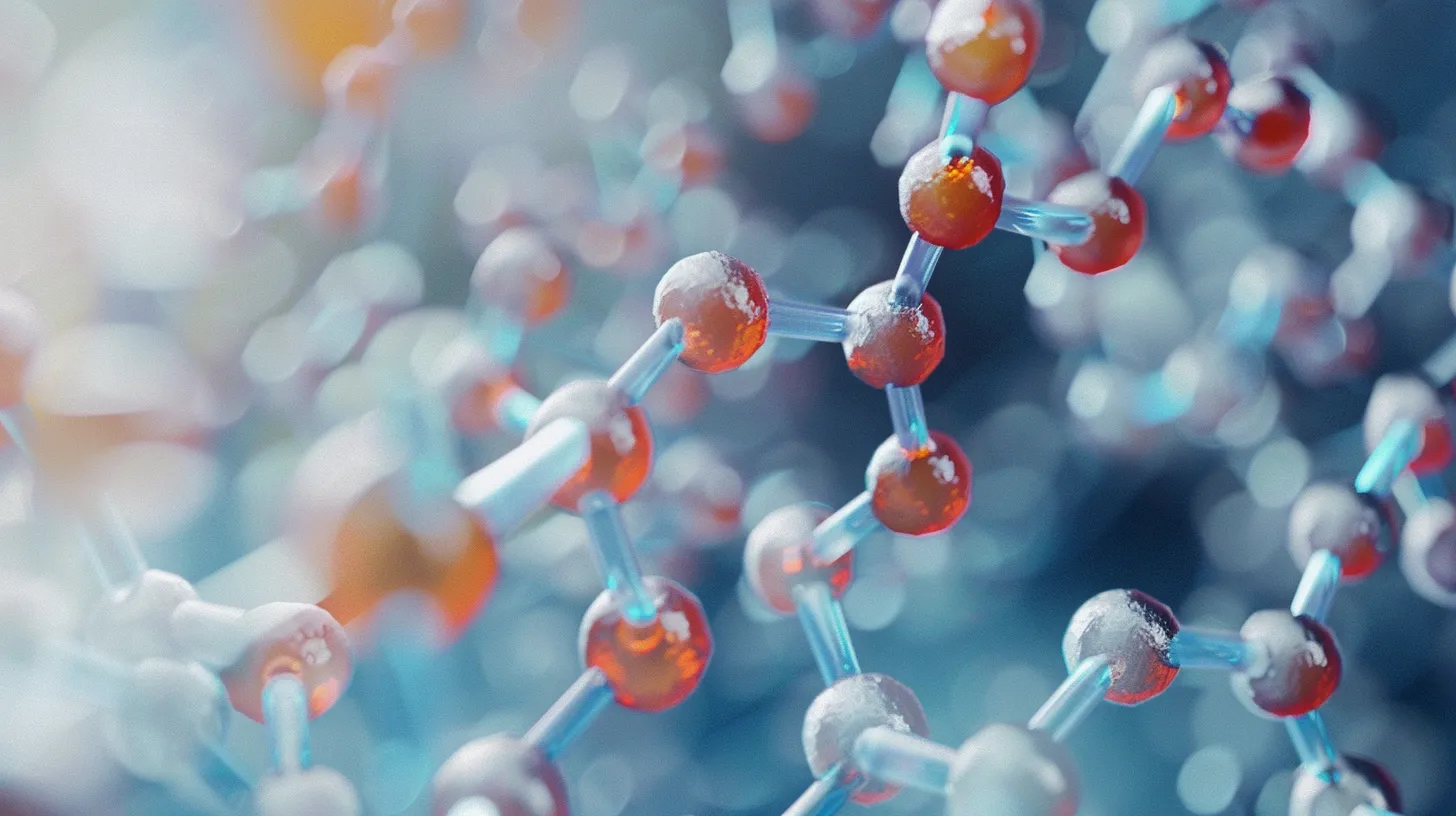

One such compound that has gained significant attention is nobiletin, a flavonoid primarily found in the peels of citrus fruits.
Nobiletin has been extensively researched for its various therapeutic properties, including brain health, anti-inflammatory effects, and metabolic regulation.
Nobiletin is a unique flavonoid that has shown promise in numerous studies, making it a subject of great interest for researchers and health enthusiasts alike.

What is Nobiletin?
Nobiletin is a polymethoxylated flavonoid, which means it contains multiple methoxy groups attached to its structure. Its chemical name is 5,6,7,8,3′,4′-hexamethoxyflavone, and its molecular formula is C21H22O8.
Nobiletin belongs to a subclass of flavonoids called polymethoxyflavones, which are known for their potent biological activities.
One of the distinguishing features of nobiletin is its high concentration in the peels of citrus fruits, particularly oranges, tangerines, and kumquats. While the flesh of these fruits contains some nobiletin, the peels are significantly richer in this flavonoid compound.
The presence of nobiletin in citrus peels has led researchers to investigate its potential health benefits, as citrus peels have been used in traditional medicine for various purposes.
Where is Nobiletin Found?
Nobiletin is primarily found in the peels of citrus fruits, with the highest concentrations reported in the following:
- Oranges
- Tangerines
- Kumquats
- Grapefruit
- Lemons
- Limes
While the flesh of these fruits contains some nobiletin, the peels are significantly richer in this flavonoid compound. For example, studies have shown that the nobiletin content in orange peels can be up to 10 times higher than in the flesh.

Traditionally, citrus peels have been used in various cultures for their potential health benefits.
In traditional Chinese medicine, dried citrus peels have been used to promote digestion, reduce inflammation, and improve circulation.
Similarly, in Ayurvedic medicine, citrus peels have been employed for their potential antimicrobial and antioxidant properties.
These traditional uses of citrus peels may have inadvertently provided the benefits of nobiletin, although its specific effects were not well understood until recent years.
With the growing interest in natural compounds and their potential health applications, nobiletin has emerged as a subject of intense research.
As a result, commercial nobiletin extracts and supplements have become available in the market, allowing consumers to access the potential benefits of this compound more conveniently.
Potential Health Benefits of Nobiletin
Brain Health and Neuroprotection Benefits of Nobiletin
Nobiletin has shown promising potential in promoting brain health and protecting against neurodegenerative diseases.
In a study published in the Journal of Nutritional Biochemistry, researchers from the University of California, Los Angeles (UCLA) found that nobiletin improved memory and cognitive deficits in a mouse model of Alzheimer’s disease. The study revealed that nobiletin reduced the accumulation of amyloid-beta (Aβ) peptides, which are associated with the development of Alzheimer’s disease.
Another study conducted by researchers at the University of Tokyo investigated the effects of nobiletin on Parkinson’s disease models. The results demonstrated that nobiletin improved motor and cognitive deficits in these models, suggesting its potential for preventing or treating Parkinson’s disease.
The neuroprotective effects of nobiletin are attributed to its ability to modulate various pathways involved in neuroinflammation, oxidative stress, and neuronal death.
These findings have sparked interest in exploring the use of nobiletin as a potential therapeutic agent for the prevention and treatment of neurodegenerative diseases like Alzheimer’s and Parkinson’s.

Anti-Inflammatory Effects of Nobiletin
Nobiletin has been extensively studied for its potent anti-inflammatory properties. Research has shown that nobiletin can inhibit the production of inflammatory mediators, such as cytokines and chemokines, by modulating various signaling pathways, including NF-κB and MAPK.
A study published in the journal Biochemical Pharmacology investigated the anti-inflammatory effects of nobiletin in a mouse model of rheumatoid arthritis. The results demonstrated that nobiletin significantly reduced joint inflammation, cartilage destruction, and bone erosion, suggesting its potential for treating inflammatory joint diseases.
Furthermore, nobiletin has been found to have anti-neuroinflammatory capacity by inhibiting lipopolysaccharide (LPS)-induced inflammation.
This property may contribute to its neuroprotective effects and potential in treating neuroinflammatory conditions.
Antioxidant Activity of Nobiletin
Nobiletin is a potent antioxidant, capable of neutralizing harmful free radicals and protecting cells from oxidative stress and damage.
A study published in the Journal of Agricultural and Food Chemistry evaluated the antioxidant activity of nobiletin and found it to be more effective than other well-known antioxidants, such as vitamin C and vitamin E.
Oxidative stress has been implicated in various chronic diseases, including cancer, cardiovascular diseases, and neurodegenerative disorders. By scavenging free radicals and reducing oxidative stress, nobiletin may play a role in preventing or mitigating the progression of these conditions.

Metabolic Benefits of Nobiletin
Several studies have explored the potential of nobiletin in improving metabolic health.
A study conducted by researchers at Kyung Hee University in South Korea investigated the effects of nobiletin on obesity and insulin resistance. The results showed that nobiletin improved hyperglycemia, insulin resistance, and total cholesterol levels in a mouse model of obesity and diabetes.
Another study published in the journal Biochemical and Biophysical Research Communications examined the effects of nobiletin on lipid metabolism. The researchers found that nobiletin increased the expression of genes involved in fatty acid oxidation and decreased the expression of genes involved in lipogenesis (fat synthesis), suggesting its potential in regulating lipid metabolism and preventing obesity.
These findings indicate that nobiletin may have beneficial effects on metabolic disorders, such as obesity, diabetes, and insulin resistance, by improving glucose and lipid metabolism.
Dosage, Safety and Availability of Nobiletin
As of now, there is no established standard dosage for nobiletin supplementation. However, various studies have used different dosages to investigate its potential health benefits.
For instance, in the study conducted by researchers at Kyung Hee University, a dosage of 0.3% nobiletin was used in the diet of obese mice, which showed improvements in insulin resistance and cholesterol levels.
While nobiletin has been generally considered safe based on animal studies, its potential side effects and drug interactions in humans are still being researched. It is essential to exercise caution when considering nobiletin supplements, as their long-term safety and optimal dosages have not been fully established.
Nobiletin is available in various forms, including citrus peel extracts and dietary supplements. Several companies offer nobiletin supplements, either as standalone products or in combination with other citrus flavonoids.
It is crucial to consult with a healthcare professional before incorporating any new supplement into your routine, as they can provide personalized advice based on your specific health conditions and medication regimen.
When searching for nobiletin supplements, it is essential to look for reputable brands that adhere to good manufacturing practices and provide third-party testing for quality assurance.
Additionally, be cautious of exaggerated claims or misleading information, as the supplement industry is largely unregulated.

Nobiletin – for better health!
Nobiletin, a polymethoxylated flavonoid found primarily in citrus peels, has garnered significant attention for its potential health benefits.
While nobiletin has demonstrated potential benefits in areas such as brain health, anti-inflammation, antioxidant activity, metabolic regulation, cancer prevention, cardiovascular protection, and bone health, it is important to note that most of these findings are based on preclinical studies.
More research, particularly clinical trials in humans, is needed to fully understand the safety, efficacy, and optimal dosages of nobiletin for various applications.

Nonetheless, nobiletin shows promise as a bioactive compound derived from a natural source – citrus peels.
For those interested in exploring the potential benefits of nobiletin, it can be obtained through citrus peel extracts or dietary supplements. However, it is crucial to consult with a healthcare professional before incorporating any new supplement into your routine.
As we continue to unravel the potential of natural compounds like nobiletin, it is worth considering the addition of citrus peels to your diet. Not only do they provide a flavorful twist to your meals, but they may also offer a rich source of this powerful flavonoid, potentially contributing to overall health and well-being.




